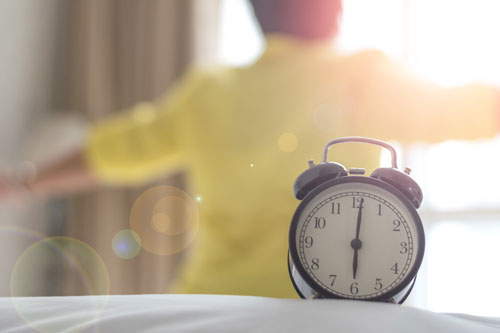A Good Night’s Sleep
Getting a good night’s sleep can allow you to awaken feeling refreshed and ready for your day. However, sometimes life gets in the way and getting a good night’s sleep can be challenging.
Tips for better sleep
- Try to go to bed at the same time each evening. Although it varies, most adults need about seven and a half hours of sleep each night to feel refreshed. Children and teens need more.
- Use the bedroom only for sleep and intimacy. Read, watch television, exercise, eat and plan schedules somewhere else.
- Turn your clock around so it is not facing the bed. Looking at the clock increases worry and frustration when you cannot sleep.
- If you cannot fall asleep within what you think might be 20-30 minutes and you begin to feel upset or frustrated, get up and go to another room. You can read or listen to quiet music until you feel sleepy. Repeat this as many times as needed. Never stay in bed awake and frustrated for very long. Avoid using your smart phone or computer in the middle of the night as the light and interaction can keep you awake.
- Exercise in the morning or late afternoon but avoid late evening exercise. It is hard to fall asleep right after exercising.
- Either large meals or hunger can prevent sleep. Do not eat large meals within two hours of bedtime. A light bedtime snack may be fine.
- Avoid caffeine in the evening including coffee, tea, chocolate or caffeinated soft drinks. This stimulant impairs the ability to go to sleep.
- Avoid alcohol in the evenings. Alcohol produces an unnatural and less restful sleep early in the night. When it wears off, it leads to early morning restlessness or awakenings.
- Avoid over-the-counter sleep medicines unless specifically discussed with your physician.
- It is important for your circadian rhythm to wake up at the same time every day regardless of how much or little you slept the night before. You may need to set an alarm.
- Try to turn on the lights — or even better — get sunshine exposure through a window or by walking outside soon after you awaken each day. This will help you synchronize your internal clock to the cycles of the natural world.
- Do not nap more than 30 minutes during the day. Try not to take a nap too late in the day or you may have more trouble falling asleep that night.
- Never drive when you are tired. It is just too dangerous.
- If you think you may have a significant sleep issue like persistent insomnia, sleep apnea or restless leg syndrome, talk to your health care provider.
